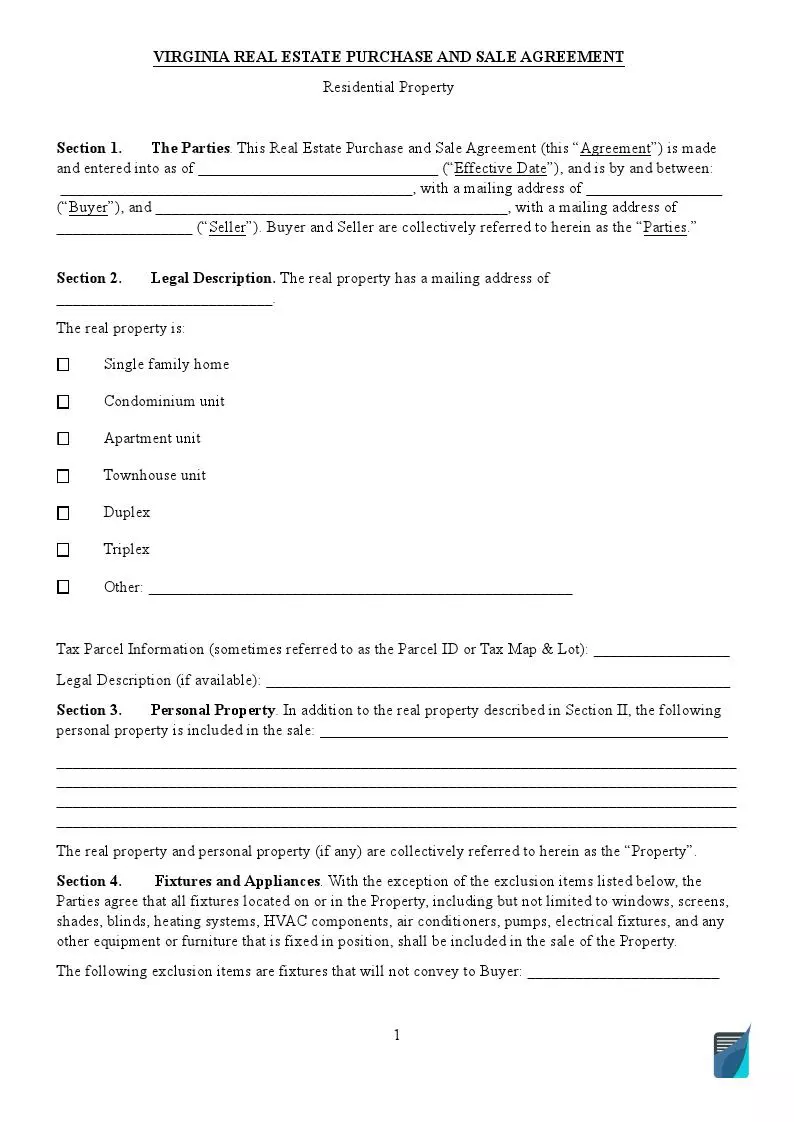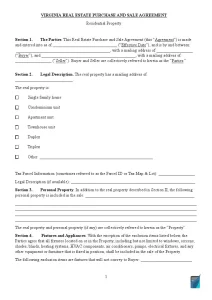Virginia Real Estate Purchase Contract
When selling or buying a home or other real property in Virginia, it is very important to document all conditions. For this, the two parties to the transaction (the buyer and the seller) create and sign a fillable real estate purchase agreement.
The seller of the real estate may draft the contract, but the conditions and the offer itself are usually put forward by the buyer. The buyer offers the seller to buy real estate from them. The seller can either agree to the offer or decline it. The third option is that the parties conduct negotiations, then come to a general agreement, and sign a document.

Build Your Document
Answer a few simple questions to make your document in minutes
Save and Print
Save progress and finish on any device, download and print anytime
Sign and Use
Your valid, lawyer-approved document is ready
Virginia Residential Purchase and Sale Agreement
The Residential Real Estate Purchase Agreement is an official legal document that spells out all the terms and conditions involving the sale of a residential property. The document is recognized as valid only after both parties (buyer and seller) have examined it and affixed their signatures.
The main parts of the contract contain data on:
- Signatories of the agreement
- Property description
- Purchase price
- Deposit
- Financial conditions
- Title insurance
- Home inspection
- Disclosure
- Other terms
- Dates and signatures
It is important to note that the seller must provide the buyer with a disclosure statement in Virginia. But it is the responsibility of the buyer to carry out an inspection to assess the defects in the home. We will tell you about the features of disclosures below.
Virginia Commercial Purchase and Sale Agreement
It is basically the same as the previous document. This is the same contract for the purchase and sale of commercial real estate.
The contract contains the same paragraphs listing the description of the parties, real estate, and all financial and schedule terms.
A real estate agent is often involved in commercial real estate transactions. Therefore, it is important to mention that according to § 54.1-2139.01 of the State Code, if an agency acts in the best interests of the buyer and the seller, it must sign a disclosure of dual agency or dual representation.
In the sale and purchase of commercial or residential real estate, the buyer should inspect the property. The purchaser hires a licensed inspector for this purpose. And within the allotted period (spelled out in the agreement), they inspect the property’s condition for compliance with the parameters specified in the agreement.
Upon completion of the inspection, several decisions can be made:
- The reality corresponds to that stated in the agreement, and the agreement remains in force
- Unspecified defects are discovered, and the seller fixes them at their own expense.
- Unspecified defects are detected, and the seller reduces the price of the property.
- Unspecified defects are discovered, and the seller refuses to reduce the price or correct the defects.
In the last two cases, additional negotiations are usually held, and if the participants fail to agree, then the deal is canceled. It is crucial to specify in the agreement as many outcomes as reasonable so that the parties can be on the same page.
Required Seller Disclosures in Virginia
Sellers must provide buyers with The Virginia Residential Property Disclosure Act. They can find the form in Title 55, Chapter 2 of the State Code. But in reality, this is not a disclosure of information about the house to the seller; instead, it is a statement about what information the seller is not obliged to disclose and a warning to the buyer that they must conduct an independent inspection.
Despite this, some disclosures still need to be presented.
1. Lead-Based Paint Disclosure
Following 42 US Code §4852d, sellers of houses built before 1978 are required to provide this document to potential buyers. It will disclose whether hazardous paint was used in the construction of the house.
2. Septic System Disclosure
If the septic system at home is not working properly, the buyer will warn about this by issuing an appropriate document. This is spelled out in § 55.1-703 (B) (8) of the Virginia Code.
3. Methamphetamine Production Disclosure
By §55.1-708 of the Virginia Code, if the home once had a methamphetamine laboratory and the home seller knows about it, they must warn the buyer. During the production of this drug, hazardous substances are released into the air, posing a danger to human health.
4. Defective Drywall Disclosure
If such drywall was used during construction, a corresponding document is filled in as specified in §55.1-705 of State Code.
5. Military Air Installation Disclosure
It is the State feature. If the dwelling is located in an area with a high level of noise due to proximity to an air force base, the buyers must be informed (§ 55.1-704).
6. New Dwelling Disclosure
Refers to new buildings that the builder is selling. If some norms were violated during the construction or the property is located in an area containing mines, shafts, or abandoned pits, this disclosure is served. The seller informs the buyer of material defects in the house (by § 55.1-706 of the Virginia Code).
To Sum Up
At the end of our article, we want to say that establishing a trusting relationship is very important for the successful experience of both parties. Even when disclosure is not needed by law, it is best to do so. Both the buyer and the seller will have obvious advantages:
- This will help to attract potential buyers; honesty and openness will interest them.
- This will save the seller from possible problems in the future; and will not encounter lawsuits from the buyer due to failure to report any dangerous defects.
- It is easier to reach an agreement with a trusting relationship, which means it is easier to carry out a deal that suits both parties.
